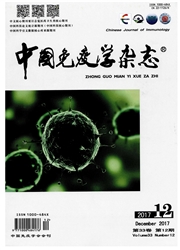

 中文摘要:
中文摘要:
目的:针对小鼠骨髓树突状细胞(DC)髓性分化因子88(MyD88),采用RNA干扰技术抑制其合成,观察脂多糖(LPS)刺激后DC生物学活性的变化,探讨获得耐受性DC的方法,为DC的临床应用提供新思路和理论依据。方法:培养小鼠骨髓源性DC,分为对照组、LPS组及RNA干扰组,对照组不予任何处理,LPS组加入终浓度为1μg/ml的LPS,RNA干扰组于加入MyD88 siRNA12小时后给予1μg/mlLPS刺激,继续培养3天。免疫细胞化学检测DCMyD88、核因子-κB(NF-κB)的表达,Western blot检测DCMyD88的表达;流式细胞术检测DC细胞表面CD80、CD86及MHC-Ⅱ分子的变化,ELISA法检测各组DC分泌TNF-α。IFN-γ和IL-12的浓度,混合淋巴细胞培养检测T细胞增殖能力。结果:LPS促进DC高表达CD80、CD86及MHC-Ⅱ分子,促进Th1型细胞因子释放、MyD88高表达及NF-κB核移位,并诱导T细胞增殖,MyD88 siRNA可阻断LPS的这些效应。结论:MyD88 siRNA可抑制DC成熟,产生耐受性DC,增强同种未成熟DC的免疫耐受诱导作用,为进一步研究DC的临床应用奠定了基础。
 英文摘要:
英文摘要:
Objective:To observe the impact of myeloid differentiaion factor 88 (MyD88) siRNA on the biological activities of dendritic cells(DCs) cultured from murine bone marrow under stimulation by Lipopolysaccharides( LPS), and provide novel ideas and basis of DC' s clinical applications. Methods: Mouse DCs were generated from bone marrow cells and were divided into control group, LPS group and RNA interference group. Control group was added nothing, and LPS group was added LPS at the final concentration of 1 μg/ml. MyD88 siRNA was added in RNA interference group, and 12 hours later LPS at the final concentration of 10 μg/ml was added. All groups were cultured for 3 days thereafter. Immunochemistry was used to detect the concentration of MyD88 and NF-KB. West- em blot was used to detect the concentration of MyD88. Flow cytometry and mixed lymphocyte reaction(MLR) was used to detect the phenotypes and functional properties of DCs. ELISA was used to detect the concentration of TNF-ct, IFN-~ and IL-12 in the supema- tant. Results:LPS stimulation increased the CDSO, CD86, MHC-I1 on the membrane of DCs and TNF-ct, IFN-~, IL-12 concentration in the supematant. LPS stimulation also increased the MyD88 in the cytoplasm and promoted translocation of NF-KB to karyon. MyD88 siRNA can inhibit all these responess. Conclusion:MyD88 siRNA can suppress maturation of DCs and promote the tolerance-induction effect of DCs.
 同期刊论文项目
同期刊论文项目
 同项目期刊论文
同项目期刊论文
 期刊信息
期刊信息
